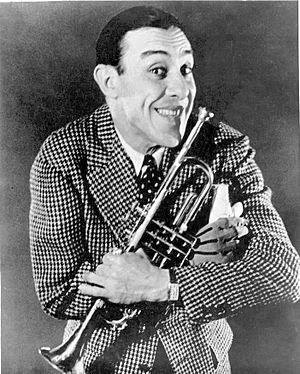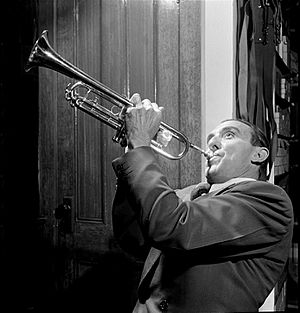Wingy Manone facts for kids
Quick facts for kids
Wingy Manone
|
|
|---|---|
 |
|
| Background information | |
| Birth name | Joseph Matthews Manone |
| Born | February 13, 1900 New Orleans, Louisiana, United States |
| Died | July 9, 1982 (aged 82) Las Vegas, Nevada, United States |
| Genres | Jazz |
| Occupation(s) | Musician, composer |
| Instruments | Trumpet, vocals |
| Years active | 1924–1982 |
Joseph Matthews "Wingy" Manone (born February 13, 1900 – died July 9, 1982) was an American jazz musician. He was a talented trumpeter, composer, singer, and bandleader. Wingy Manone was known for his lively jazz style and friendly singing voice. Some of his famous songs include "Tar Paper Stomp" and "Tailgate Ramble".
Contents
Who Was Wingy Manone?
Joseph Matthews Manone was born in New Orleans, Louisiana. When he was ten years old, he had an accident with a streetcar. This accident caused him to lose his right arm. Because of this, people started calling him "Wingy." He used a special arm (a prosthesis) so well that most people didn't even notice he had a disability.
Starting His Music Career
Wingy Manone began playing the trumpet and cornet professionally in his hometown. In the 1920s, he started traveling across America. He played music in many big cities like Chicago, New York City, and St. Louis. He continued to travel and perform throughout the United States and Canada for many years.
His Unique Jazz Style
Wingy Manone's music style was very energetic and fun. It was similar to another New Orleans trumpeter, Louis Prima. Wingy played "hot jazz," which is a fast and exciting kind of jazz music. He often added funny spoken parts to his songs, using his deep, gravelly voice.
Many musicians respected Wingy Manone's talent. He was often asked to play on other artists' recordings. For example, he played on some early records by Benny Goodman. He also led his own groups, sometimes using fun names like "The Cellar Boys" or "Barbecue Joe and His Hot Dogs."
Famous Songs and Movies
One of Wingy Manone's biggest hits was "Tar Paper Stomp" from 1929. This song's main tune was later used for Glenn Miller's famous song, "In the Mood." He also had a popular version of the song "The Isle of Capri" in 1934.
Wingy Manone's band often recorded different versions of their songs. They would make versions with his singing for countries like America, Canada, and Britain. For other countries where people didn't speak English, they would record versions with just the instruments. This means you can find more than one recording of many of his songs! Other popular songs included "There'll Come a Time (Wait and See)" and "The Broken Record."
Throughout the 1930s, Wingy Manone and his band recorded music regularly. They also performed on the radio. In 1940, he even appeared with Bing Crosby in the movie Rhythm on the River. In 1943, he made short musical films called Soundies.
Later Years and Legacy
Wingy Manone wrote a book about his life called Trumpet on the Wing. It was published in 1948.
From the 1950s, he mostly lived in California and Las Vegas, Nevada. However, he still traveled to perform at jazz festivals in the United States, Canada, and Europe. In 1957, he tried to make music for the growing rock-and-roll audience. He released his own version of "Party Doll," a hit song by Buddy Knox.
Wingy Manone wrote many songs. Some of his compositions include "Tar Paper Stomp," "Tailgate Ramble" (with Johnny Mercer), and "Stop the War (The Cats Are Killin' Themselves)." In 2008, his song "There'll Come a Time (Wait and See)" was used in the movie The Curious Case of Benjamin Button.
Wingy Manone passed away in 1982. He left behind his son, Joseph Matthew Manone II, and his grandson, Jimmy Manone, who were also musicians. He was also featured in a 2001 TV documentary called Jazz by Ken Burns.
Fun Facts
For many years, Wingy Manone's good friend Joe Venuti would send him a single cuff link on his birthday. Joe Venuti was a jazz violinist known for his funny pranks!
See also
 In Spanish: Wingy Manone para niños
In Spanish: Wingy Manone para niños
 | Emma Amos |
 | Edward Mitchell Bannister |
 | Larry D. Alexander |
 | Ernie Barnes |


